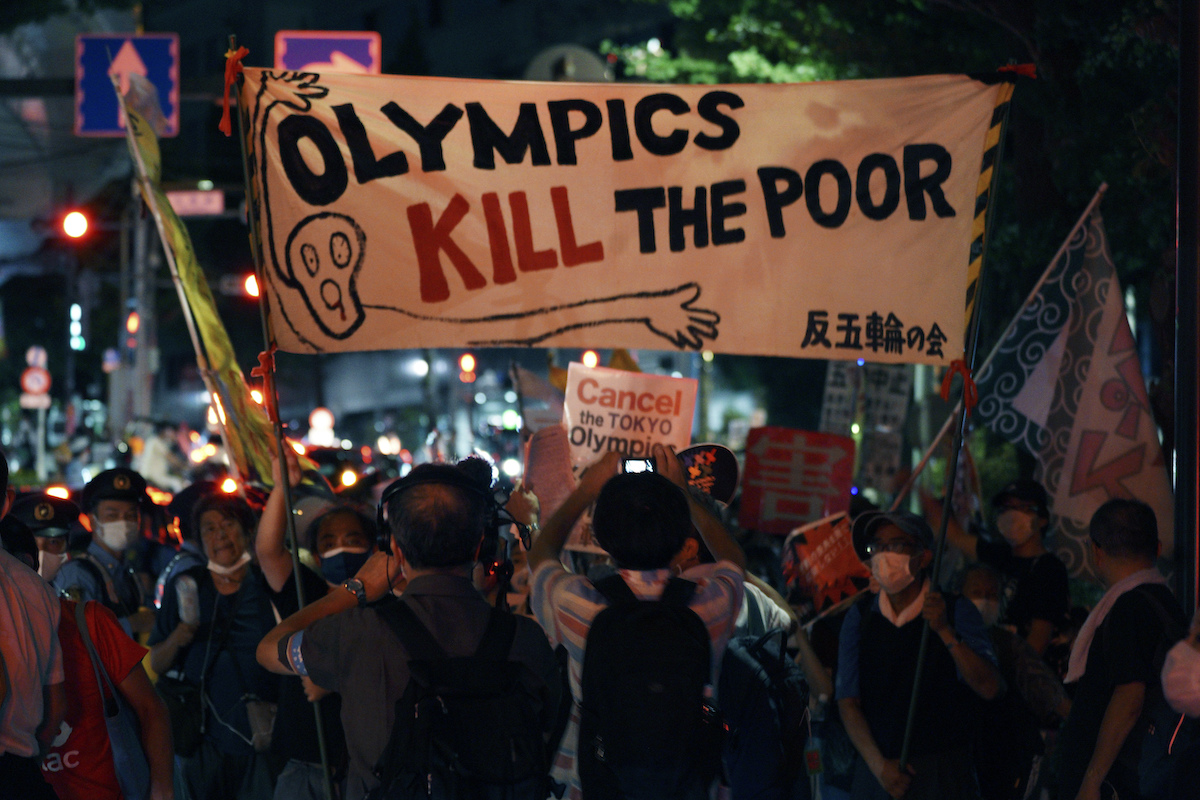“What do we want?” shouted Satoko Itani at a protest in Tokyo on July 23rd. “Cancel the Olympics!” the crowd of protesters yelled back.
To say that the 2021 Summer Olympics Games are controversial would be an understatement. But with growing COVID-19 cases, a growing collection of angry Japanese citizens and a city put into massive debt, it’s clear that the Games should not have happened.
With a growing pandemic, financial disarray and an increasing level of stress across the globe, continuing with the Olympics at a time like this was a bad idea.
The idea of hosting the Olympics right in the middle of a global pandemic is just preposterous. According to the Olympics official website, a series of countermeasures have been put in place to effectuate COVID safety. These measures include restrictions on spectators, insurance of health monitors and consistent COVID tests. Despite these actions, a growing number of athletes and employees have tested positive. Furthermore, the entire metropolitan area of Tokyo and Osaka are in a state of emergency, Hosting the Games is only making it worse by prolonging and exacerbating an already prevalent health crisis. The pandemic isn’t over. We can’t just all go back to “normal” again. The Games are not safe and having them right now was not a smart idea.
The citizens of Tokyo didn’t even want the Games to happen. The build up of contempt from the citizens of Tokyo has incited protests that have occurred just outside of the Games. Citizens of Tokyo are angry. For months they have been cited saying that they don’t want the Olympics to happen. According to a poll run by Japanese news outlet The Asahi Shimbun, 83% of those surveyed were against hosting the Games, with 43% wishing that they were canceled and 40% wishing that they were delayed. In addition, the Tokyo Medical Practitioners Association, an organization made up of about 6,000 primary care doctors, advised the Games to be canceled.
Hosting the Olympics is not only a health disaster, but an economic disaster as well. A Japanese government audit estimated that Tokyo spent $28 billion on the Olympics overall. Without the spectators, there is no tourism, and thus no cash flow into the country. Economist Andrew Zimbalist estimates that the Games will lose $35 billion. Comparing this to the 2016 games, Rio De Janiero spent a total of $13 billion putting up the Games and in return lost only $2 billion. Tokyo has set themselves up for a much larger deficit.
Tokyo is losing money to host something that could have easily been canceled or postponed, just as citizens of Tokyo demanded. So not only is hosting the Olympics Games pushing the spread of COVID-19 and the Delta variant, but it is also causing financial complications within the country that is hosting.
This year’s Games are also tough on the athletes competing. The entire world was put under stress from this pandemic, the athletes are not an exception. That kind of stress on your mind weighs on your body and trying to push through and do so much athletic activity is not healthy. Now, in the middle of the Games, that stress has built up and hindered their performances. Simone Biles is a perfect example of this when she withdrew from the gymnastics floor final and a shot at gold. Similarly, olympic tennis player Novak Djokovic threw his tennis racket after losing a chance to medal. It is not unreasonable to think that participating in the Games was detrimental to the mental health of not only both Biles and Djokovic, but the mental health of possibly all the other 11,090 athletes competing.
Without the fun of spectators being there to cheer on their team, the Olympics are just not the same. In a time of such darkness, we are all looking for ways to feel joy again. The Olympic Games were supposed to help us find some normalcy. Unfortunately, the desolate arenas look more like a middle school swim meet than a congress of world class athletes competing in the name of themselves and their country.
Yes, the Olympics are important and it’s fantastic that we continue to do them. But now is not the time, nor is this the way. We should have pushed them aside and remembered that, as a world, we were all going through the same thing—and that should have brought us together more than the Olympic Games, but we continued to ignore it.
Proceeding with the Olympics is a danger to our health, a danger to the citizens of Tokyo, a danger to Japan’s finances and a danger to the athletes. It isn’t benefiting the world in the ways that it has before. The Tokyo Olympics should not have happened.






